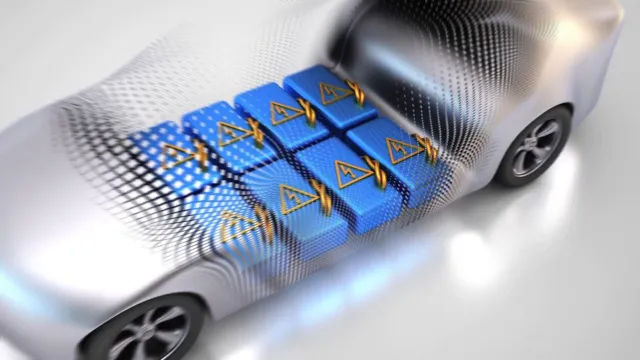Unleashing the Truth: Debunking Electric Car Battery Carbon Emissions Myths
Electric car battery carbon emissions are a hot topic in the discussion of sustainable transportation. While electric cars offer a greener alternative to traditional gasoline-powered vehicles, the production and disposal of their batteries still contribute to carbon emissions. As the world transitions towards a more sustainable future, it is crucial to understand the impact of electric car batteries on the environment.
This blog will explore the carbon emissions associated with electric car batteries, their production, and disposal, and how they compare to the emissions of traditional gasoline-powered vehicles. Join me as we dive into the world of electric car battery carbon emissions.
Current State of Electric Car Battery Carbon Emissions
Electric car battery carbon emissions are a topic of concern as the shift towards electric vehicles gains momentum. While it is commonly known that electric vehicles produce lower emissions than their gas-guzzling counterparts, it is crucial to take into account the carbon emissions produced during the battery manufacturing process. The majority of electric vehicle batteries are made using lithium-ion technology, which requires mining and processing of raw materials, transportation of goods, and energy-intensive manufacturing processes.
These activities result in significant carbon emissions, and their impact is dependent on the location where the battery components are sourced, manufactured, and assembled. However, researchers and manufacturers are working towards reducing the carbon footprint of electric vehicle batteries through more sustainable and efficient production processes. As the industry continues to evolve, it is expected that the carbon emissions from electric vehicle batteries will continue to decrease in the future.
Overview of Electric Car Battery Technology
The current state of electric car battery carbon emissions remains a critical issue that needs to be addressed. While electric cars are gaining popularity due to their eco-friendly nature, the same cannot be said about the batteries they use. Most electric car batteries are made of lithium-ion, which is known to emit a significant amount of carbon during manufacturing and disposal.
Although efforts have been made to reduce these emissions, there is still a long way to go. In fact, studies have shown that up to 15% of an electric car’s carbon footprint comes from its battery. However, it’s not all bad news, as advancements are being made in battery technology that promises to reduce these emissions significantly.
For instance, Tesla has announced plans to use iron-based batteries that are less carbon-intensive than their lithium-ion counterparts. As the demand for electric cars continues to increase, we must prioritize the development of more sustainable battery technologies to ensure the long-term viability of electric vehicles.
Carbon Emissions During Battery Production
Electric car battery production is often touted as a solution to reduce carbon emissions, but the process of manufacturing these batteries still emits a significant amount of carbon dioxide. In fact, a recent study found that producing the battery for an electric car can result in more carbon emissions than producing a regular gas-powered car. The reason for this is the production process and the materials needed to create a battery, such as lithium and cobalt, both of which require a lot of energy to extract and refine.
However, it’s important to note that as technology advances and more renewable energy is incorporated into the production process, the carbon emissions from electric car battery production can be significantly reduced. Additionally, using an electric car over time can still result in a significant reduction in overall carbon emissions compared to using a gas-powered car.
Vehicle Use and Carbon Emissions
Electric Car Battery Carbon Emissions Electric cars are becoming increasingly popular as people become more conscious of the impact of carbon emissions on the environment. However, there is still a lot of confusion and debate around the carbon emissions associated with the production and disposal of electric car batteries. While it is true that the production of electric car batteries does generate carbon emissions, the total emissions are still significantly lower than the emissions associated with traditional combustion engines.
In addition, as renewable energy sources become more widespread, the carbon footprint of electric car batteries will continue to decrease. It’s important to remember that while electric cars are not perfect, they are an important step towards reducing our overall carbon footprint and mitigating the effects of climate change.
Comparing Electric Cars to Gasoline Cars
When it comes to comparing electric cars to gasoline cars, one important factor to consider is the carbon emissions produced by their batteries. While electric cars are often touted as being more environmentally friendly due to not producing exhaust emissions during operation, the production of their batteries can create significant carbon emissions. However, research has shown that the overall carbon emissions from electric car batteries are still significantly lower than those produced by gasoline cars over their lifetime.
In fact, a study by the Union of Concerned Scientists found that even when taking into account the production of electric car batteries, electric cars produce around 50% less carbon emissions than gasoline cars over their lifetime. Additionally, as renewable energy sources such as wind and solar power become more prevalent, the carbon emissions produced during battery production will continue to decrease. In short, while the production of electric car batteries may create carbon emissions, the overall impact of electric cars on the environment is still significantly lower than that of gasoline cars.
Carbon Emissions During Refueling
When it comes to emissions, electric cars are often touted as the superior option to traditional gasoline cars. One of the key areas where they outperform is during refueling. Gasoline cars emit a significant amount of carbon into the atmosphere during the refueling process, due to the release of fumes from both the gas station and the car’s own exhaust system.
Electric cars, on the other hand, emit zero emissions during the refueling process, as they are powered by electricity and do not require any fuel. This means that electric cars have a lower carbon footprint overall, especially if the electricity used to power them comes from renewable sources. While there are other factors to consider when comparing electric and gasoline cars, it’s clear that electric cars have a clear advantage when it comes to reducing carbon emissions during refueling.
Lifetime Carbon Emissions of Electric and Gasoline Cars
When it comes to lifetime carbon emissions, electric cars are the clear winner over gasoline cars. In fact, studies have shown that electric cars emit an average of 1/3 less carbon emissions over their lifetime compared to gasoline cars. This is because gasoline cars are fueled by non-renewable sources such as oil, whereas electric cars can be powered by renewable energy sources such as solar or wind power.
Additionally, electric cars have higher efficiency ratings which means less wasted energy and fewer emissions. While it’s true that manufacturing electric cars can have a higher carbon footprint compared to gasoline cars, this is offset by the emissions savings during their lifetime. So, if you’re looking to reduce your carbon footprint and make a positive impact on the environment, an electric car is the way to go.
Environmental Impact of Battery Disposal
When it comes to the environmental impact of battery disposal, electric cars have a clear advantage over their gasoline-powered counterparts. While both types of cars have batteries that eventually need to be disposed of, the materials used in electric car batteries are typically less harmful to the environment. Gasoline cars, on the other hand, have lead-acid batteries that can leak toxic chemicals like sulfuric acid and lead into the soil and water.
In addition, electric car batteries can often be recycled, reducing the need for new materials and minimizing waste. Of course, there are still challenges to be addressed in terms of responsibly disposing of electric car batteries, but the overall impact is much less damaging than that of gasoline cars. So, if you’re concerned about the environment, it’s worth considering making the switch to an electric car and supporting more sustainable transportation options.
Improving Electric Car Battery Carbon Emissions
Electric car battery carbon emissions are a major concern for the environment. However, steps are being taken to improve them. One way is to use more sustainable materials in the production of batteries, such as recycled metals and responsibly sourced minerals.
Additionally, advancements in battery technology are increasing their energy density, allowing for longer driving ranges with fewer emissions. The shift towards renewable energy sources, like solar and wind power, also plays a vital role in reducing overall carbon emissions. It is important to continue researching and developing new methods to improve electric car battery efficiency and reduce their impact on the environment.
By doing so, we can ensure a cleaner, more sustainable future for ourselves and generations to come.
Advancements in Battery Technology
Electric car battery carbon emissions can be a significant obstacle for the adoption of electric vehicles. That’s why advancements in battery technology are focusing on improving the carbon footprint of these batteries. Many electric car manufacturers are investing in the development of batteries that reduce their carbon emissions.
One strategy is to use more sustainable materials, such as recycled lithium and cobalt, or to eliminate them altogether by using new technologies like solid-state batteries. The goal is not only to reduce emissions during the manufacturing process but also to extend the life of the battery, so fewer batteries are needed overall. By improving the sustainability of electric vehicle batteries, we can help mitigate the environmental impact of electric cars and make them a more viable option for the future.
Increasing Use of Renewable Energy Sources
As the world moves to increase its use of renewable energy sources, one area that has come under closer scrutiny is the electric car battery. While electric cars are heralded as an environmentally-friendly alternative to traditional gas vehicles, their batteries still have a carbon footprint. However, research is being conducted to find ways to improve the carbon emissions of these batteries.
One promising solution involves using more sustainable materials such as recycled lithium and cobalt, which are commonly used in lithium-ion batteries. By incorporating more sustainable materials, the entire lifecycle of the battery can be made more eco-friendly. This approach not only benefits the environment, but it also creates a more circular economy where materials are reused instead of thrown away.
By using recycled materials, we can reduce the amount of resources needed to create new batteries and ultimately help reduce our carbon footprint. Overall, improving the environmental impact of electric car batteries is an important step towards a more sustainable future.
Conclusion
In the race to reduce carbon emissions and combat climate change, electric cars have emerged as a strong contender for a greener future. However, the production of electric car batteries has raised questions about their environmental impact. While the process of producing these batteries does result in carbon emissions, the overall reduction in emissions from electric cars compared to gasoline-powered cars is significant.
So, while some may argue that electric car batteries contribute to carbon emissions, it is important to remember that the long-term benefits of switching to electric cars outweigh any short-term drawbacks. In other words, it may be a small step back, but a giant leap forward in the fight for a sustainable future. “
FAQs
How do electric car batteries impact carbon emissions?
Electric car batteries can significantly reduce carbon emissions compared to gas-powered vehicles. While the production of electric car batteries does have some carbon footprint, their use results in much lower carbon emissions than traditional cars.
What is the average lifespan of an electric car battery?
The average lifespan of an electric car battery is typically 8-10 years, although this can vary based on usage and factors such as temperature and charging patterns.
Can electric car batteries be recycled?
Yes, electric car batteries can be recycled. The recycling process can help reduce the carbon footprint of the battery and the overall environmental impact of electric vehicles.
What are the environmental benefits of using electric car batteries?
Using electric car batteries can reduce carbon emissions and air pollution, as well as reduce dependence on fossil fuels. Additionally, the use of electric car batteries can help promote the development of renewable energy sources.




